 We're fortunate to be connected to nature in Colwood and wildlife such as black bears, cougars and other animals are part of the coastal ecosystem. This means from time to time we may encounter Deer in our neighbourhoods, catch a glimpse of wildlife such as Cougars, Bears, in natural areas or find Marine Life, and Jellyfish on the beach.
We're fortunate to be connected to nature in Colwood and wildlife such as black bears, cougars and other animals are part of the coastal ecosystem. This means from time to time we may encounter Deer in our neighbourhoods, catch a glimpse of wildlife such as Cougars, Bears, in natural areas or find Marine Life, and Jellyfish on the beach.
When you are in natural areas, be aware of your surroundings. Keep children nearby and pets on leash. And please do not litter or leave food or other materials that may attract wildlife to the area.
Below is some information about strategies to deter wild animals from entering neighbourhoods and suggestions about how to respond should you encounter the wildlife that our natural environment is home to.
Deer
 Deer are part of Colwood's natural environment, but they can be a cause for concern. Common issues include risk of collisions with vehicles, damage to gardens and the potential spread of Lyme disease.
Deer are part of Colwood's natural environment, but they can be a cause for concern. Common issues include risk of collisions with vehicles, damage to gardens and the potential spread of Lyme disease.
Wildlife population control is largely a provincial responsibility and regional solutions are being developed in partnership with the Province of British Columbia. If you have concerns about deer issues, please contact the Capital Regional District deermanagement@crd.bc.ca.
If you encounter an injured deer, please report it to BC Conservation at 1-877-952-7277 or Colwood Public Works at 250-474-4133.
Deceased animals
If you come across a deceased animal on a Colwood roadway or public property, please contact Colwood Public Works at 250-474-4133 and they will remove it.
If the animal is on private property, please contact a local hauling or yard maintenance company who may offer this service. (The City is not able to offer services on private property. See Victoria Animal Control Services for more information.)
Cougars
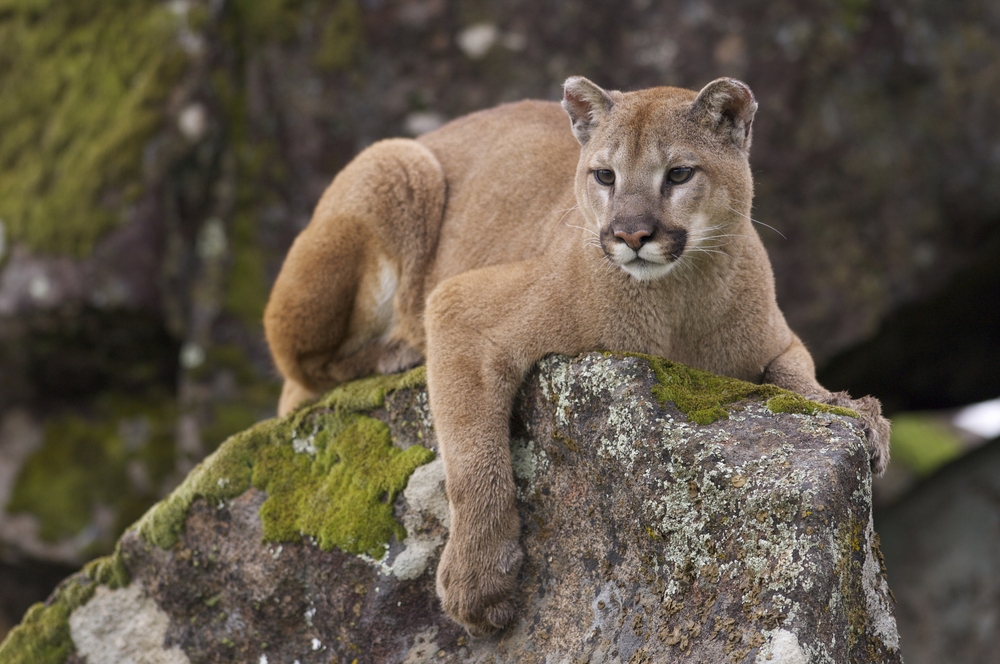 On very rare occasions, cougars are sighted in the West Shore area. Most often they are glimpsed and then gone. If you suspect you may have seen a cougar, you may wish to contact the BC Ministry of Environment Conservation Centre at 1-800-663-9453.
On very rare occasions, cougars are sighted in the West Shore area. Most often they are glimpsed and then gone. If you suspect you may have seen a cougar, you may wish to contact the BC Ministry of Environment Conservation Centre at 1-800-663-9453.
The BC Ministry of Environment offers these tips for cougar encounters:
If you encounter a cougar, stay calm and back away slowly. Never run or turn your back on a cougar.
- Stay calm and keep the cougar in view.
- Pick up children and small pets immediately - they frighten easily, the noise and movements they make could provoke an attack.
- Back away slowly, ensuring that the animal has a clear avenue of escape.
- Make yourself look as large as possible.
- Keep the cougar in front of you at all times.
- Never run or turn your back on a cougar. Sudden movement may provoke an attack.
If a cougar shows interest or follows you, respond aggressively.
- Maintain eye contact with the cougar, show your teeth and make loud noise.
- Arm yourself with rocks or sticks as weapons.
- Crouch down as little as possible when bending down to pick up things off of the ground.
If a cougar attacks, fight back.
- Convince the cougar you are a threat and not prey.
- Use anything you can as a weapon.
- Focus your attack on the cougar's face and eyes.
Black Bears
It is rare to encounter bears in our area, but on occasion, a black bear may wander through. You can help deter bears from entering neighbourhoods by keeping garbage secured, cleaning your barbecue grill, harvesting fruit trees, berry patches and vegetable gardens regularly, and cleaning fallen fruit off the ground.
The BC Ministry of Environment offers the following tips for bear encounters.
If you do encounter a bear, remain calm and don't panic:
- Keep away from the bear and keep kids and pets close.
- Never approach the bear and do not run from it, just walk away slowly.
- Calmly advise others of the bear’s presence, without yelling.
- Once the bear has left, check your yard to ensure there is nothing there to attract them back, such as garbage, fallen fruit, bull bird feeders, or a tasty smelling BBQ grill.
- If you are concerned about a bear, contact the BC Ministry of Environment Conservation Centre at 1-800-663-9453.
Visit the BC Ministry of Environment website for more information about bear safety.
Marine Life
What to do if you see a deceased marine animal on the beach in Colwood.
If you come across a deceased marine animal such as a seal or sea lion on the beach, you may report it to Colwood Public Works at 250-474-4133.
Our waterfront falls under the authority of Fisheries and Oceans Canada. Their policy is to let nature take its course when animals die in nature, and they advise municipalities to do the same. Children and pets should be kept a reasonable distance from the animal. As sad as it may be to see a deceased marine animal, these situations can provide an opportunity to expand our knowledge and understanding of marine animals and coastal ecosystems.
If you see a marine mammal that you believe is in distress:
1. Stay back
2. Keep people and pets away
3. Call Colwood Public Works at 250-474-4133. They may call the Marine Mammal Rescue Centre at 604-258-SEAL (7325).
Rescue situations, and their recommended courses of action, vary dramatically depending on the species concerned. Other critical factors are also involved, such as age, behaviour, location and apparent health. Please don't try to help an animal on your own.
Understanding The Situation
It's normal for seals and sea lions (pinnipeds) to spend time on land, and so seeing one onshore doesn't necessarily mean a rescue is needed. 30-40 percent of their time may be spent ashore: resting; socializing; escaping predators; giving birth and nursing or warming themselves in the sun. Some species will mate on land as well.
It's best to contact an experienced marine mammal rescue organization before attempting to rescue a seal, sea lion or any other marine mammal. Trained rescuers will assess the situation and determine whether intervention is necessary.
If you see a pinniped on land, don't try to coax, pull or push it back into the water. Seals and sea lions are wild animals, and approaching too closely can cause them undue stress. If they feel threatened, they may bite (even small pups!). Keep them and yourself safe by staying back as far as possible (the Canadian Marine Mammal Regulations specify a distance of 100 metres).
It's also important to keep pets away. Dogs may inflict wounds on marine mammals, and there's a risk of disease transmission between the species.
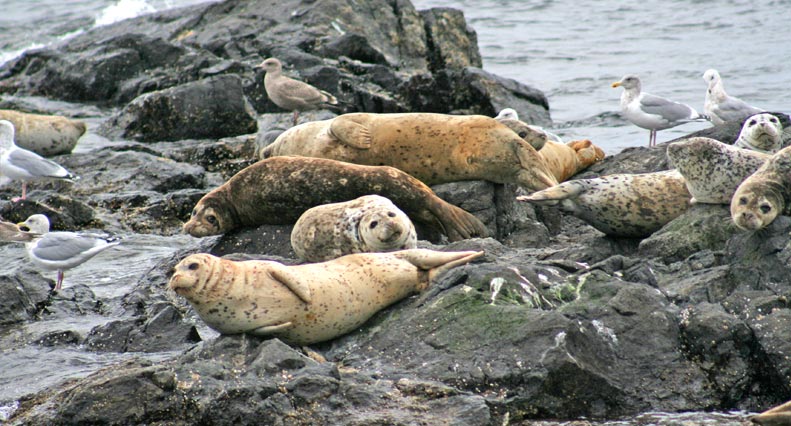 Harbour Seals
Harbour Seals
Harbour Seals are members of the Phocidae family and are one of the true seal species found off Victoriaʼs waters. True seals have pin holes in the sides of their heads for ears with no external ear flaps. They also have fur covering their flippers. Sea lions have small external ear flaps and naked flippers, thus they are not considered a true seal species.
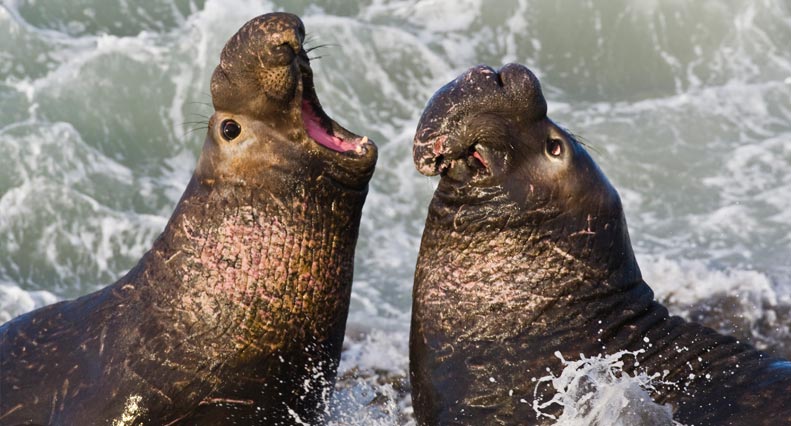 Northern Elephant Seals
Northern Elephant Seals
Elephant Seals are not a common sight in the Strait of Juan de Fuca, but their presence is a real treat on a few occasions from spring until winter. Both males and females occasionally rest at Race Rocks Lighthouse, spending time basking in the sun atop the rocky islands. Northern Elephant Seals occupy Pacific waters from Alaska to Mexico.
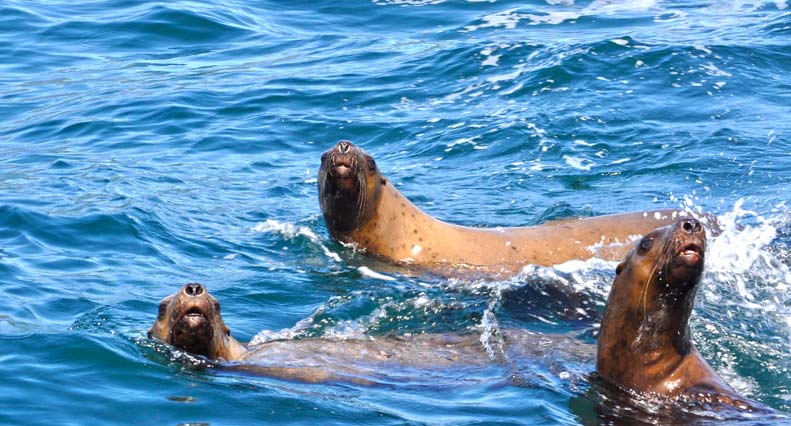 California Sea Lions
California Sea Lions
Like their relatives the Stellar Sea Lions, California Sea Lions also belong to the Otariidae family. They are a well-known species whose population extends from the Alaskan Panhandle to southern Mexico. They are most abundant from California to the southern tip of the Baja Peninsula. Females remain in locations off California and Mexico, while the males will venture further north to places like Race Rocks Lighthouse near Victoria.
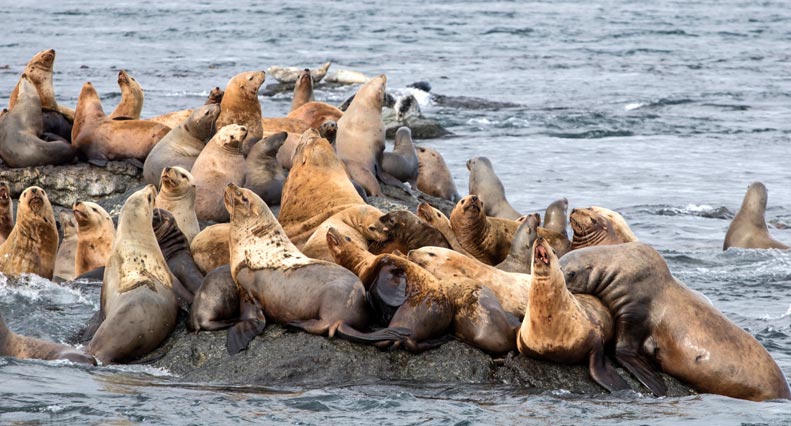 Stellar Sea Lions
Stellar Sea Lions
Steller Sea Lions are some of the noisiest (never mind smelliest), marine mammals on our coastline. They are entertaining as they growl and roar as they challenge other males for space on the rocks. Steller Sea Lions are a honey-brown colour with large, dark brown flippers.
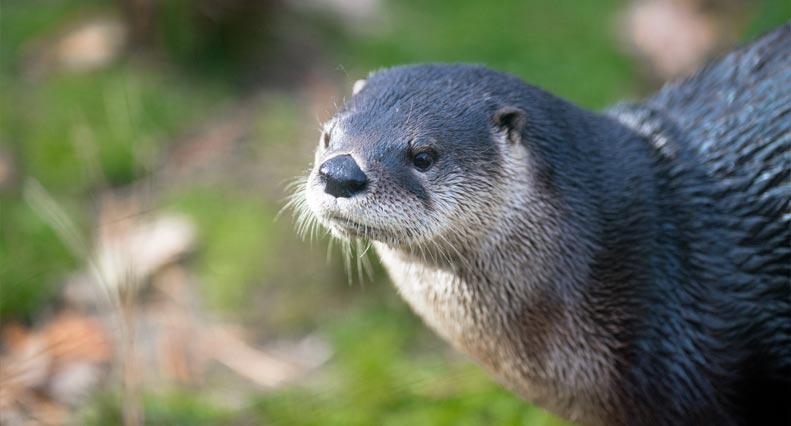 River Otters
River Otters
River Otters are members of the Mustelids family and occupy both sea and freshwater habitats along the Pacific coast and throughout North America. They prefer to be near shore or inland waters, as they are more at home on land than they are in the water. River Otters have long, slender bodies, with long tails that they use for steering while they swim.
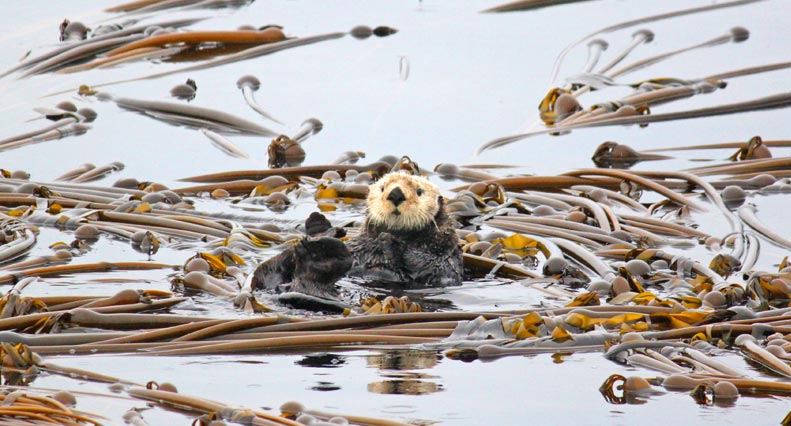 Sea Otter
Sea Otter
The cuddly-looking Sea Otter is the smallest of all marine mammals. They can grow to over 1.5m (5 feet), and can weigh a healthy 36kg (80 pounds). They are true marine mammals, spending almost their entire lives in the water, even giving birth while at sea. Because Sea Otters spend so much time in cold waters, they have a very dense layer of fur as opposed to a thick blubber layer like whales, sea lions and seals.
Jellyfish
 During August and September, it is not unusual to see Lion's Mane jellyfish along the Colwood waterfront. They are a native species that is round, reddish and (obviously) jelly-like.
During August and September, it is not unusual to see Lion's Mane jellyfish along the Colwood waterfront. They are a native species that is round, reddish and (obviously) jelly-like.
The jellyfish spend most of their life offshore, within 20 metres of the ocean surface. But the drifters are carried by ocean currents and often end up in shallow, sheltered bays toward the end of their lives.
These jellyfish do sting. The sting feels something like one or more bee stings and would likely produce welts, redness and swelling for a few days, becoming itchy as it heals. If you happen to encounter a jellyfish and have any concerns, check it out with a doctor.
Note that they can sting if you brush up against them, even if they are dead. They have a pressure-release mechanism that allows them to sting after death.



 Harbour Seals
Harbour Seals Northern Elephant Seals
Northern Elephant Seals California Sea Lions
California Sea Lions Stellar Sea Lions
Stellar Sea Lions River Otters
River Otters Sea Otter
Sea Otter